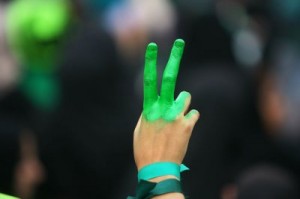Saturday
Feb202010
Iran: "It's All Over" for the Green Movement?
 Saturday, February 20, 2010 at 7:14
Saturday, February 20, 2010 at 7:14  It is one of the most striking articles to come out of Iran in recent weeks. A journalist for a US newspaper, who has stayed behind when his colleagues have left or been expelled, sits in a kitchen with four Iranian activists:
It is one of the most striking articles to come out of Iran in recent weeks. A journalist for a US newspaper, who has stayed behind when his colleagues have left or been expelled, sits in a kitchen with four Iranian activists:The opposition supporters nervously smoked cigarettes in the kitchen as loud music blared from the empty living room. A student, a businessman, a writer and an artist had planned a victory party but instead were mourning their defeat.
"It's all over," said the student, a young woman in a sleek black dress. "Our only option is to leave the country."
That is the opening of Thomas Erdbrink's atmosphere piece in The Washington Post this morning, and the bleakness is unrelenting:
"It was impossible to join up with other protesters," the student at the party said as she tried to reconstruct what went wrong. "There were just too many security forces."
She took a puff from her 10th cigarette that evening. "We were all supposed to meet up at the main square where Ahmadinejad would speak. There, we would all bring out green ribbons, to show how many we were," she said.
Instead, she found small pockets of protesters in side alleys, not knowing where to go or what to do. "We ended up with a couple thousand people running from the security forces," she said. "Our movement needs new tactics, but I have no idea what we should do."
After (or before?) the encounter in the kitchen, there are the thoughts of the Iranian blogger:
"I hope they can come up with new strategies, but I have no idea what those should be," said an influential blogger who is a member of an unofficial opposition think tank made up of Web activists. He suggested turning the first anniversary of the disputed June 12 presidential election into a day of protest.
"But I guess the government would just repeat what they do normally: declare each protest illegal and flood the streets with security forces," he said.
"In the end, the street is the only place where we can show how many people we are, but few people are ready to go to prison or get hurt," he said.
During recent demonstrations, he recalled, his friends would call him from their homes and offices while he was running from the police.
"If they are not ready to sacrifice anything, why should I be?" he asked. "My personal strategy out of this mess is to apply for a visa for Canada."
After the inclusion of former journalist Abbas Abdi, "There are moments that one person should say: This is how we will do this, whether you like it or not", Erdbrink returns to the gloom of the kitchen:
At the party, there was consensus on one issue. "Just because our protest failed, that doesn't mean we have lost our anger," the student said. "We have a very simple demand: freedom. But I don't see how we can get it."
So that's that, then? With The Post headline blaring, "Iranian opposition demoralized after failed protests at revolution's anniversary", has the white flag been unfurled?
Hmm....
Erdbrink is a very good journalist, and I don't it is possible to overestimate his tenacity in trying to report from Iran when most foreign reporters have deparated the country. That tribute, however, should not stand in the way of critiquing an article which quickly jumps from being an interesting snapshot to posting a once-and-for-all declaration.
A useful start might be another look at that opening paragraph at the failed "victory party". That indicates that Erdbrink's kitchen interview took place on 22 Bahman (11 February).
That was, indeed, a depressing day for many in the Iranian opposition. But I don't think it is a wild claim to suggest that the mood might not be permanent and/or fatal to the movement. In the following nine days, there have been re-assessments and renewed declarations. There has been not only the signal of the meeting between Mir Hossein Mousavi and Mehdi Karroubi but also statements from other reformist groups and activist organisations.
Of course, it would be a jump from analysis to speculation to argue that these numerous but often scattered signs mean that the opposition has regained the momentum of Ashura (27 December). For Erdbrink, however,
all of this can be set aside on the basis of his four depressed partiers, one blogger, and one "political analyst": "The government's strategy might eventually backfire, but for the time being, it has served to justify authorities' dismissal of the opposition as a meaningless band of foreign-backed counterrevolutionary rioters."
Reporting, especially first-hand reporting, is valuable. Sweeping predictions are dangerous. Erdbrink's article is likely to race around the Internet and discussion boards today as the definition of "defeat", but another nine days from now, its declarations will likely be another footnote to this ongoing conflict.
Marathon, not a sprint.






